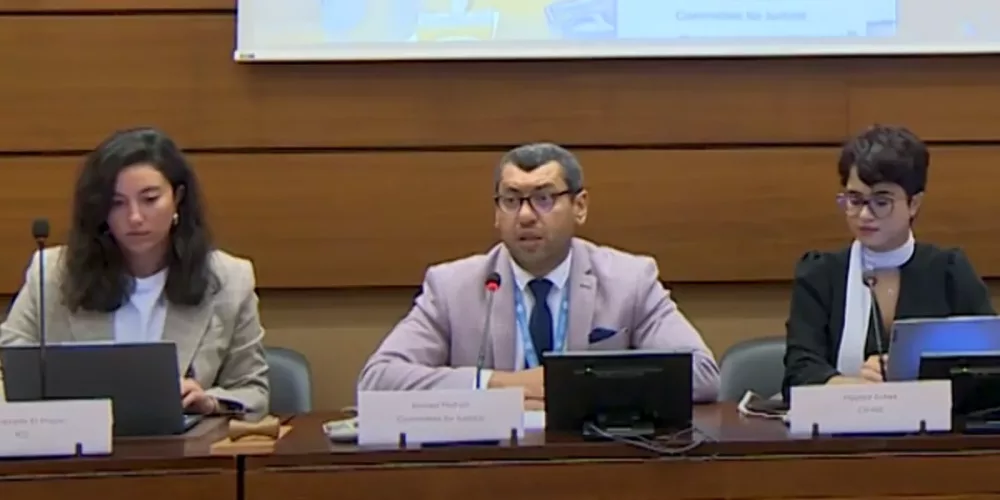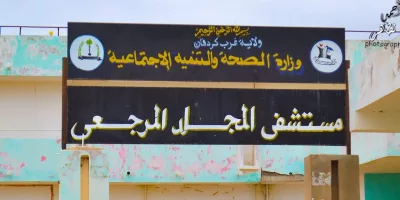Press Report
Ahmed Mefreh, the Executive Director of the Committee For Justice, participated in a side event on the margins of the 57th session of the UN Human Rights Council, addressing the far-reaching impact of Egypt’s new Criminal Procedures Law on human rights.
Mefreh began his remarks by outlining several repressive laws passed by the Egyptian authorities over the last decade and their significant impact on human rights in the country. He explained how these laws were introduced as part of the authorities’ attempts to tighten their control over the political landscape and suppress any form of dissent under the pretext of “counter-terrorism” and safeguarding national security.
– The protest law:
Among these legislations was the Protest Law, enacted in 2013, which severely restricted the right to assembly and expression. The law requires prior approval from authorities for organizing any gathering or protest, leading to the arrest of thousands of peaceful protesters, thus shrinking the civil liberties space in Egypt.
Mefreh explained that according to figures documented by CFJ, between September 2013 and the end of 2014, 13,000 people were arrested under this law and referred to various courts on charges related to protesting.
– Law expanding military trials for civilians:
Similarly, the 2014 Law No. 136 expanded the powers of military courts to try civilians in cases related to what the authorities describe as “attacks on vital installations.” Thousands of civilians have been tried before military courts under this law, courts that are known to lack basic standards of justice. According to CFJ estimates, from 2014 to early 2020, approximately 14,000 civilians were tried in military courts, with many sentenced to long prison terms, some ranging from 10 to 15 years.
– Anti-terrorism law (2015):
The Executive Director of CFJ also discussed the Anti-Terrorism Law, one of the most repressive legislations, which expanded the definition of terrorism to include even peaceful activities that criticize the regime. This law has been used as a tool to prosecute thousands of activists and journalists. In 2022 alone, according to CFJ monitoring, around 25,000 people were repeatedly detained under this law, often without clear charges or fair legal procedures, contributing to widespread human rights violations.
– Media and internet laws:
Mefreh noted that the Egyptian authorities have enacted laws restricting media freedom and expression online, including the Press Regulation Law and the Cybercrime Law. Under these laws, hundreds of media and human rights websites have been blocked, with the number reaching approximately 600 websites. These laws have also enhanced governmental surveillance of the internet, violating constitutional and international rights related to freedom of information.
– NGO law (2019):
Mefreh explained that the NGO Law, passed in 2019, imposed severe restrictions on the work of non-governmental organizations, including human rights groups. This law criminalizes civil society work in Egypt and limits foreign funding to these organizations, significantly constraining the activities of civil society, which plays a crucial role in defending freedoms and monitoring human rights violations.
– Devastating impact of these laws:
Mefreh highlighted that these laws have led to a significant deterioration in the human rights situation in Egypt. According to CFJ reports, since the beginning of this year alone, more than 1,450 violations have been documented, including arbitrary arrests, enforced disappearances, and ill-treatment in detention centers. Pressures on human rights defenders, journalists, and civil society members have also intensified.
– A surprising move and blatant disregard:
Mefreh stated, “Despite ongoing efforts to counter these repressive legislations, the Egyptian authorities surprised the international human rights community by proposing a new bill to amend the Criminal Procedures Law, containing over 540 articles.”
He stressed that “this move cannot be seen as a mere passing act; rather, it is a clear message to all international mechanisms, especially the UN, that the Egyptian regime is not genuinely committed to adhering to international standards, treaties, and conventions. The regime’s reviews and international engagements are merely attempting to improve its image.” He added that this constitutes a blatant disregard for the numerous recommendations made by these mechanisms, which have repeatedly stated that the Egyptian regime is violating international standards with these repressive laws.
– Reconsidering the approach towards the Egyptian regime:
Mefreh concluded his remarks by recommending that “UN mechanisms and the international community must reconsider their strategies for dealing with the Egyptian regime. The ‘open-door’ policy and soft diplomacy have proven ineffective in dealing with a regime that relies on repressive legislations to silence dissent and consolidate its power.”
The event was held on Friday, September 20, in Room 25 at the UN Human Rights Council in Geneva. It focused on the proposed amendments to Egypt’s Criminal Procedures Law, which are expected to exacerbate human rights violations, as they grant broader powers to the public prosecution, which could be used to suppress political opposition and human rights defenders.






